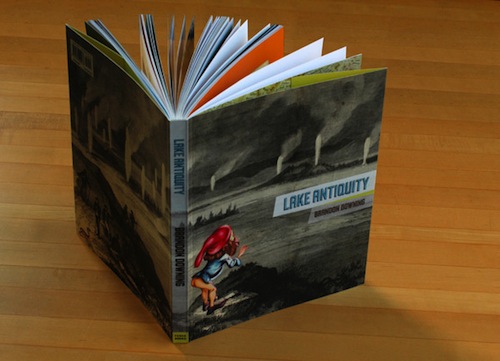Lake Antiquity, Rebecca Wolff, and the Futility and Future of Poetry
Take a look at this piece at Jacket2 by poet Luke Bloomfield on Brandon Downing's wondrous colossus Lake Antiquity--which, if you haven't perused, is "one hundred and ninety pages, full color, about one square foot, numerous X-Acto blades, sticks of glue, ephemera, twelve years of labor" and subtitled “Poems: 1996–2008,” as Bloomfield notes right away. He continues:
Lake Antiquity is another iteration of the future of poetry. With this book, the argument what is poetry and what is not is moot. To the reader on the lookout for irony, the subtitle works in the way a nonprofit would tack an “Inc.” after its name. To the diehard traditionalist, the anti-Flarfist beating his chest, defining this book as a collection of poems constitutes a gross misrepresentation. The text is more often than not as much a component of the collage as the collage itself. Rarely does the text surpass the purely visual element of the book. The term “art book” might be more apt, except not at all. The fact that the text is found and collaged is superseded by the majesty of the book. It is a visual poetic that delves into history long past and recent (Surrealism, Camp, the Pictures Movement, Flarf, etc.) while looking towards the future.
Way back in 2006 when Dan Hoy published what many perceived as a polemic directed toward Flarf, there was still an active concern about what was permissible in poetry and what was not. That that is no longer a concern is made apparent by (at least one aspect of) the context in which Lake Antiquity was published.
When tolerance of uncertainty is taken to the brink, when it becomes clear that there will never be reconciliation, that which arouses the uncertainty, the object of thought let’s say, has achieved its purpose in a very pure way. There is no reconciliation in Lake Antiquity, nor need there be. Its nuance is fully conceived and perfectly executed, and it comes to us without apology. This book is relevant. In April 2010, at the Juniper Festival in Amherst, Massachusetts, Fence publisher Rebecca Wolff, participating on a panel called “The Future of Poetry,” declared poetry futile; anyone writing poetry in America who believes poetry is a form of activism engages in “gross relativism” and would be better suited teaching elementary school (that these toxic claims are couched in a discussion about the future of poetry is important). Backlash was minimal: nowhere were there the sort of rallying cries in defense of poetry, its future, or attacks on Wolff (except one, but she struck back). Her comments went largely unnoticed, even after she posted them verbatim on HTMLGIANT[1]. Perhaps this is because nobody really believed her — I didn’t, to be sure, because the release of Lake Antiquity by Wolff’s own press contradicts her dour declamation. Actions louder than words?
Bloomfield then turns what could be a review into something more complex, and includes Wolff's comments on the present and future of poetry below the piece. "The future of poetry: I see a lot of younger poets embracing historicity, and context, and also struggling with futility, as a theme and as a function of poetry. I also see a lot of poets exhibiting different approaches to dealing with what I will call “self-y-ness.” I concur with poetry’s futility, and wish to support it..." Read the rest, which includes the mention of younger writers she's full-steam behind, here.



